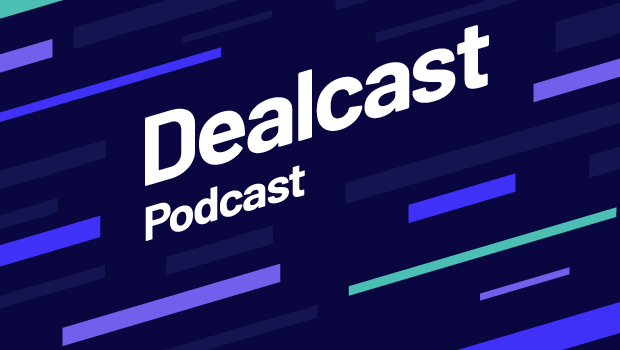Artificial Intelligence Regulation in Brazil
12 May 2023
Today we're heading to São Paulo to find out about a new bill intended to regulate the use of artificial intelligence (AI) in Brazil. Joining us is Max Gonzales, a Brazil-based correspondent for Mergermarket, who sheds light on the proposed new framework for AI in the country.
Dealcast is presented by Mergermarket and SS&C Intralinks.
Transcript
[MUSIC PLAYING] JULIE-ANNA NEEDHAM: Hello, and welcome to Dealcast, the weekly M&A podcast presented to you by Mergermarket and SS&C Intralinks. I'm Julie-Anna Needham. I'm a business journalist who's been covering M&A for a decade. In this episode, we're heading to Sao Paulo to find out about a new law designed to regulate artificial intelligence. I spoke to Max Gonzales, a Brazil-based correspondent for Mergermarket.
Hi, Max. Thanks very much for joining me today.
MAX GONZALES: Hi, Julie. Thanks for having me.
JULIE-ANNA NEEDHAM: So Max, we've seen AI explode in the public consciousness recently with the popularity of ChatGPT. Can you tell us what's happening in Brazil and what Brazil's doing to regulate AI in the country, please?
MAX GONZALES: Yes, thanks. Brazil's national congress has set a project of law, which is set to define, regulate, and make accountability of the use of artificial intelligence systems in Brazilian territory. So it is a measure of three draft bills created by representatives from the lower house, and it was measured by a committee of legal specialists nominated by the Brazilian Federal Senate. So the president of the Federal Senate has just defined the final version of this law, and it is to be voted on within weeks.
JULIE-ANNA NEEDHAM: And so can you run through what kind of rules will be included in Brazil's AI bill, please?
MAX GONZALES: First, the bill defines what is artificial intelligence systems, and then defines the rights of the people who will be affected by the systems. If the systems are not transparent, the law sets a kind of fines and punishments for the companies which are using that systems with the proper transparency. The Brazilian people has the right to be informed if they are dealing with an artificial intelligence systems or a human-run system that you exchange information to find hiring and so on.
And the law is trying to define an authority, an organization from the government to define the final rules and the enforcement to the rules.
JULIE-ANNA NEEDHAM: OK. Thank you. And can we have a look at how this regulation could affect tech businesses, particularly in relation to M&A activity, please? Can you talk us through that?
MAX GONZALES: Yes. The companies which use and develop artificial intelligence systems wants to see legal certainty of their operations, and the artificial intelligence law will set those rules. They are important to define when the company is doing things right and is not potentially sued by the consumers, which have the right to be informed with what systems they are dealing with.
So the companies I heard to report from Mergermarket and part say that the business wants to see the rules clear and set by law to present to the investors their systems, and then they will be able to be invested.
JULIE-ANNA NEEDHAM: So Max, can you tell us what investors, advisors, and tech companies themselves are saying about the AI bill, please?
MAX GONZALES: Businesses are willing to have the law because they set rules which are defining what could be a legal company, a company which is complying the rules, and it will make the business more attractive for investors. The law, when it's approved, will not increase the M&A activity in the short-term. The investors say-- the companies say the investors will ice the business in the long-term after good analysis of the systems. And it's important because the transparency, the compliance with the rules, are important to define if the company is good to invest.
JULIE-ANNA NEEDHAM: OK. And so is it popular amongst investors, advisors, and tech companies? Is it seen as a popular move? Are they on board with it?
MAX GONZALES: Yes. They welcome the laws because it could make the companies more attractive. But in the other side, some advisors and investors see the technology as faster development than the law, and they are very skeptical about defining what is a good system and an ethical system based on artificial intelligence.
So Joao Silva, from the corporate venture builder Aduela Ventures, said it's key because the AI bill could lock the market instead of developing it. But the companies, the software developers, are really excited by the law because they want the rules to define what they can do and they cannot do and be more attractive for the investors.
JULIE-ANNA NEEDHAM: Yeah, and it certainly feels globally. Regulators are struggling to keep up with the pace of technology-- not just in Brazil, but just about everywhere else.
MAX GONZALES: Yes. I have good information on this because Norway's oil fund, the sovereign fund from Norway, who has the CEO Nicolai Tangen, said the sovereign fund will set rules to all the companies it invests to use ethically the artificial intelligence. It's a demand from the investors.
JULIE-ANNA NEEDHAM: Thank you. That's really interesting. And so, just bringing it back to Brazil, can we broaden it out from AI? The Brazilian congress is seeking to approve a law to regulate the digital platforms more widely, isn't it? There is an additional law going through alongside this AI bill. Can you tell us more about that, please?
MAX GONZALES: Yes. Brazil was about to vote the fake news law. It's a law that defines what the big tech and all the technology companies can do about information for the public and defining what could be false information, a false statement, and it tries to regulate all the platforms to make them accountable for falsehoods or hate speech. And so it was defined in the last weeks, and because of the 8th of January attack to the National Congress, which was-- it has the incentive-- it was powered by the social media. So the Brazilian Congress run and create a new law bill to define what is fake news, and what could be the punishments, the sanctions, for the companies who will distribute them.
And it is a very hot issue in Brazil because the last political elections were defined by the internet war. The social media took a very, very important role in the election of the last two presidents, Jair Bolsonaro and Lula da Silva. The law is now in the National Congress to be voted. It was suspended a few days ago, so we are waiting the definition for the proper voting again.
JULIE-ANNA NEEDHAM: So it sounds like the political focus is on the fake news law first, and then once that has been taken care of, attention will turn back towards the AI bill. Would that be right?
MAX GONZALES: Is that right? Brazilian Congress attacking 8th of November set the agenda and make the fake news law more important and promptly for the voting than the artificial intelligence law. But the attack to the congress, it was powered by social media. It was set by groups in Telegram and WhatsApp messaging systems. So it make the National Congress react and create the fake news law and put the artificial intelligence law aside. It's not abandoned it, but it's not the priority for the national congress agenda.
JULIE-ANNA NEEDHAM: That's great. Max, that's really interesting. Thanks very much.
That was Max Gonzales speaking to us from a rather noisy Sao Paulo. Thanks for listening to this week's episode of Dealcast, presented by Mergermarket and SS&C Intralinks. Please rate, review, and follow the podcast. You'll find us on Apple Podcasts, Spotify, or look out for your Mergermarket news alert. For more information, have a look at our show notes. Join us again next week for another episode.


